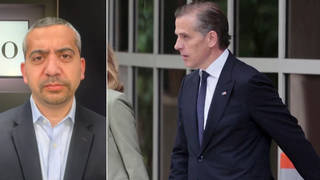
Related
Guests
- Dr. Stephen Soldza psychologist, public health researcher, and professor at the Boston Graduate School of Psychoanalysis. He joins me from now Boston. Dr. Soldz is a founder of the Coalition for an Ethical Psychology and maintains the Psyche, Science, and Society blog.
Just over a week ago, a major operating manual for the US military’s prison camp at Guantanamo Bay was leaked and posted on the internet. Among other disclosures, it reveals that isolation and sensory deprivation of prisoners was official Army policy. We take a look at how this affects the debate within the American Psychological Association and the participation of its members in interrogations. [includes rush transcript]
Just over a week ago, a major operating manual for the US military’s prison camp at Guantanamo Bay was leaked and posted on the internet [Click for pdf].
The 238-page manual titled “Standard Operating Procedures for Camp Delta,” is dated March 27, 2003, and signed by Army Major General Geoffrey Miller, who was then the commander of the prison.
The document shows that the military had an official policy of denying some prisoners any access to independent monitors of the International Committee of the Red Cross, or ICRC, something the military has repeatedly denied.
Another disclosure is the use of isolation and sensory deprivation techniques as a means of “preparing” detainees. It says incoming prisoners are to be held in near-isolation for the first two weeks to foster dependence on interrogators and “enhance and exploit the disorientation and disorganization felt by a newly arrived detainee in the interrogation process.”
This disclosure has strong relevance to the debate within the American Psychological Association, which continues to condone psychologists’ work on interrogations at Guantanamo and CIA black sites. Its counterparts, the American Medical Association and the American Psychiatric Association, have both banned their members from participating in interrogations.
Transcript
AMY GOODMAN: Just over a week ago, a major operating manual for the US military’s prison camp at Guantanamo was leaked and posted on the internet. The 238-page manual, titled “Standard Operating Procedures for Camp Delta,” is dated March 27, 2003, signed by Army Major General Geoffrey Miller, who was then the commander of the prison.
The document shows that the military had an official policy of denying some prisoners any access to independent monitors of the International Committee of the Red Cross, something the military has repeatedly denied.
Another disclosure is the use of isolation and sensory deprivation techniques as a means of “preparing” prisoners. It says incoming prisoners are to be held in near-isolation for the first two weeks to foster dependence on interrogators and “enhance and exploit the disorientation and disorganization felt by a newly arrived detainee in the interrogation process.”
This disclosure has strong relevance to the debate within the American Psychological Association, which continues to condone psychologists’ work on interrogations at Guantanamo, CIA black sites, other sites around the world. Its counterparts, the American Medical Association and the American Psychiatric Association, have both banned their members from participating in interrogations.
Dr. Stephen Soldz joins us now, a psychologist, public health researcher, professor at the Boston Graduate School of Psychoanalysis. joining us from Boston. He’s the founder of Coalition for an Ethical Psychology and maintains the “Psyche, Science, and Society” blog. Welcome to Democracy Now!, Dr. Soldz.
DR. STEPHEN SOLDZ: Thank you, Amy.
AMY GOODMAN: Can you talk about this manual and the latest on this dispute within the American Psychological Association?
DR. STEPHEN SOLDZ: Well, the manual got leaked a few weeks ago on the Wikileaks website, which is a site maintained by journalists for leaks of secret materials from governments around the world. I received an email simply giving me the link to it.
And one of the — in addition to the ICRC point — the International Committee of the Red Cross — that detainees had been held basically incommunicado, not allowed to have access to the ICRC, there was this point about isolation. And this was mentioned in some of the mainstream press accounts, but I don’t think they really got its significance. Isolation is the core torture or abusive interrogation technique developed by the US government over — used in many years. We hear about waterboarding; waterboarding is an extreme that was used on a few people, it is horrifying, but isolation is the essence of it. It’s what the CIA uses routinely. It’s what — as Tara McKelvey was saying, it doesn’t sound that bad. But we’re — people are social animals. We exist in a world of interaction with others. To be kept in a cell, often in darkness or, in any case, without any stimulation, with no contact — the guards feeding you often have masks on, don’t speak — this — it’s well known from psychiatric literature, from research, this breaks down the human soul over time.
Now, what the manual showed is that, as you said, this was routine for the first two weeks and in fact continued for the second two weeks and possibly longer. It’s a little unclear there, at the discretion of the Joint Intelligence Group, which was the group in charge of interrogations. And what it made clear for the first time — we’ve known this, in some sense, but this is official documents — it made clear that the intent of the isolation is to break the detainees down and to make them dependent on the interrogators.
Now, the American Psychological Association, we’ve been fighting a battle around the issues of psychologists participating in interrogations. We know that psychologists have played a central role in creating abusive interrogations, at standardizing them, at implementing them, and at disseminating them. Now, the American Psychological Association has been taking a stand for participation of psychologists in these interrogations, but claiming that they don’t participate in abuses, and have passed several resolutions against torture and cruel, inhuman and degrading treatment, the official legally banned categories. So what I wanted to do was find out — because on isolation and sensory deprivation, these core techniques, there had been a lot of language in the resolution that was ambiguous, that allowed these to continue under certain circumstances, allowed psychologists to participate in them.
AMY GOODMAN: Dr. Soldz, we only have a minute to go, so I just want to make sure we get to the point, to the key point here on the American Psychological Association’s stance after the big debate at their annual meeting that we covered in San Francisco, and also the number of college psychology departments that are now demanding the APA take a different stance on psychologists’ involvement in interrogations, like Earlham, like Guilford, like California State at Long Beach, like Smith College, all demanding the APA change their stance.
DR. STEPHEN SOLDZ: Yeah. Well, just there seems to be some motion. We’re hopeful with the APA on part of the interrogations, on the isolation. We’ll see. But increasingly, psychologists in different places, including these psychology departments, and this was a movement that just came out of the blue, as far as I knew about it, and has spread like wildfire, that psychologists saying, no, we don’t want to be a part of this, that the APA has to change. Just last week, I heard from a psychology department who said the entire department wanted to resign, that they had just found out about this, and they were outraged. So, psychologists, or at least a large segment of psychologists, simply won’t put up with this. And it’s up to the APA now to clarify and change their stance.
AMY GOODMAN: Dr. Stephen Soldz, I want to thank you for being with us, speaking to us from Boston. I also want to say Tara McKelvey will be at the Culture Project tonight in New York, speaking on the issue of impeachment.












Media Options